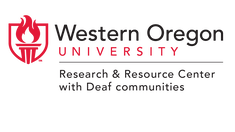PLI Repository:
Visit our online repository to access resources curated by the Protactile Language Interpreting National Education Program for interpreters, service providers, and the DeafBlind community. Click the button below to be taken to our Digital Commons collection, hosted by Western Oregon University. We are adding new items all the time, so check back later for updates!
DeafBlind Interpreting: Toward Effective Practice
This publication shares the outcomes of a comprehensive needs assessment whose purpose was to ascertain the competencies required of interpreters working with DeafBlind individuals. Conducted in 2017 by PLI staff and the Core Team, the Needs Assessment serves as the first step or component of the larger curriculum effort undertaken by PLI, that being the development and dissemination of a curriculum guide that includes learning objectives, activities, and source materials for use by qualified educators and trainers.
The materials presented on interpreting with DeafBlind people are intended for interpreters and interpreter educators, as well as for DeafBlind people seeking resources on advocacy and working with interpreters. There is also information useful to researchers, interpreter coordinators, and others seeking to increase their knowledge in this area.
It is the hope of PLI that the reader, irrespective of background, will use this resource for learning, teaching and advancing the field. We hope that the content will spur dialogue that leads to the expression of philosophical ideas, and new and bold approaches to interpreting for DeafBlind persons.
DeafBlind Interpreting: Toward Effective Practice is offered as a publication that can be downloaded as a single comprehensive report, or retrieved in stand-alone units or sections. Click the button below to download the full report or any of these sections. Each stand-alone unit is as follows:
The materials presented on interpreting with DeafBlind people are intended for interpreters and interpreter educators, as well as for DeafBlind people seeking resources on advocacy and working with interpreters. There is also information useful to researchers, interpreter coordinators, and others seeking to increase their knowledge in this area.
It is the hope of PLI that the reader, irrespective of background, will use this resource for learning, teaching and advancing the field. We hope that the content will spur dialogue that leads to the expression of philosophical ideas, and new and bold approaches to interpreting for DeafBlind persons.
DeafBlind Interpreting: Toward Effective Practice is offered as a publication that can be downloaded as a single comprehensive report, or retrieved in stand-alone units or sections. Click the button below to download the full report or any of these sections. Each stand-alone unit is as follows:
Annotated Bibliography
The Annotated Bibliography first began as a project of the National Task Force on DeafBlind Interpreting to help support infusing the current Interpreter Education Training Program format with DeafBlind related content (i.e. tactile communication, guiding, and describing the environment). Because there is no standard across IEPs to offer stand-alone DeafBlind interpreting courses, content experts culled what materials had been produced over time in the field and synthesized the most salient findings into this document. Some materials may be more challenging to locate and reproduce but by-in-large, these materials remain in existence and can be located or tracked via the PLI online repository, NCRTM or NCDB’s digital archives.
As the DeafBlind community continues to mobilize, there will be more need for updating content to reflect the growing linguistic and cultural demands of this minority group and new materials will need to address this. To that end, PLI is committed to supporting dissemination efforts of any new publications, content and research.
As the DeafBlind community continues to mobilize, there will be more need for updating content to reflect the growing linguistic and cultural demands of this minority group and new materials will need to address this. To that end, PLI is committed to supporting dissemination efforts of any new publications, content and research.
Other RESOURCES:
|
The National Clearinghouse of Rehabilitation Training Materials (NCRTM) offers the vocational rehabilitation and education communities an opportunity to contribute new knowledge to their specific fields and gain visibility for their work.
|


